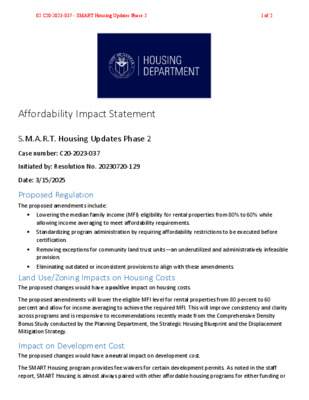02 C20-2023-037 - SMART Housing Updates Phase 2 Affordability Impact Statement — original pdf
Backup

Affordability Impact Statement S.M.A.R.T. Housing Updates Phase 2 Case number: C20-2023-037 Initiated by: Resolution No. 20230720-129 Date: 3/15/2025 Proposed Regulation The proposed amendments include: • • Lowering the median family income (MFI) eligibility for rental properties from 80% to 60% while allowing income averaging to meet affordability requirements. Standardizing program administration by requiring affordability restrictions to be executed before certification. • Removing exceptions for community land trust units—an underutilized and administratively infeasible provision. • Eliminating outdated or inconsistent provisions to align with these amendments. Land Use/Zoning Impacts on Housing Costs The proposed changes would have a positive impact on housing costs. The proposed amendments will lower the eligible MFI level for rental properties from 80 percent to 60 percent and allow for income averaging to achieve the required MFI. This will improve consistency and clarity across programs and is responsive to recommendations recently made from the Comprehensive Density Bonus Study conducted by the Planning Department, the Strategic Housing Blueprint and the Displacement Mitigation Strategy. Impact on Development Cost The proposed changes would have a neutral impact on development cost. The SMART Housing program provides fee waivers for certain development permits. As noted in the staff report, SMART Housing is almost always paired with other affordable housing programs for either funding or 02 C20-2023-037 - SMART Housing Updates Phase 2 1 of 2 density bonuses, such as the Low-Income Housing Tax Credit or Affordability Unlocked, which means deeper affordability requirements are required in almost all cases. Staff have found that fewer than 10% of applications within the last five years have provided exclusively 80% MFI units for rental. The amendments to MFI may mean that certain developments which are considered "workforce housing" may see fewer fee waivers. However, the amendments to allow income averaging ensures that full fee waivers will still be available to workforce housing, but will encourage additional units at deeper 50% and 60% MFI levels in alignment with the City's Strategic Housing Blueprint goals. Impact on Affordable Housing The proposed changes would have a positive impact on affordable housing. These amendments will strengthen affordable housing outcomes by increasing the number of deeply affordable units available. By aligning incentives with the City’s strategic goals, these updates ensure that more housing is accessible at 50% and 60% MFI levels. Streamlining administrative processes will also enhance the program’s effectiveness, making it easier to implement affordability requirements efficiently. S.M.A.R.T. Housing remains a leading model among peer cities, where fee waiver programs are less common. These updates modernize the program to reflect current housing priorities while maintaining its role as a key affordability tool. The amendments were developed based on staff analysis of administrative challenges and reviewed by the Affordable Housing Coalition to assess any unintended consequences. Other Policy Considerations None. Manager’s Signature ______________________________________________________________ 02 C20-2023-037 - SMART Housing Updates Phase 2 2 of 2